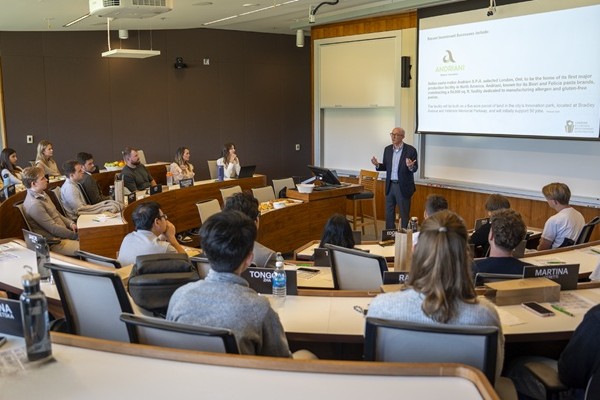Through classroom sessions, community visits, and corporate engagement, the Ivey/CEMS Fall 2025 Block Seminar and Orientation introduced visiting international students to how leaders balance ambition with social responsibility — bringing the program’s focus on purpose and place to life.
Held August 25 to September 4, the activities served as a kick-off to the students’ CEMS year at Ivey, introducing them to Canadian business and community life while emphasizing that leadership requires both global perspective and local grounding.
Faculty expertise shapes leadership lessons
This year’s theme – Purpose, Place, Perspectives, People, Practices, and Practitioners – aligned with the new CEMS graduate profile, which emphasizes developing reflective, responsible, and resilient leaders equipped with competencies in global leadership, technology advocacy, problem-solving, and sustainable practice. Over five days, students engaged with Ivey faculty on topics highlighting how business leaders can be stewards of communities, organizations, and ecosystems. Sessions included:
- Mazi Raz, MBA ’05, PhD ’14, on purpose-driven leadership;
- Lara Liboni on systems thinking and sustainability;
- Yasser Rahrovani on the role of data and technology in international business;
- Hayden Woodley on emotional intelligence and resilience;
- Kanina Blanchard on Ivey's social partners, alumni, and professionals;
- David Wood, HBA ’97, MBA ’12, on learning with cases; and,
- Danielle Carr (staff) on living Ivey Values
“For the first time, we brought together an amazing group of faculty to engage, motivate, and inspire students to excel beyond learning and toward embodying the kind of purposive leader they seek to grow into being,” said Ivey Assistant Professor Kanina Blanchard, CEMS Academic Director. "Our entire semester has been curated to create the opportunity for students to develop into leaders of the future who will successfully engage as international business practitioners and as ethical, responsible and inclusive citizens."
Experiencing Canadian business and community life
To understand the local and national context, the students also toured London, Ontario and Toronto, visiting industries such as Labatt Breweries and exploring the history and diversity of the cities. The experiences underscored how place influences leadership and community development.
Guest speaker Larry MacKinnon, Director of Business Development at the London Economic Development Corporation, discussed how investment, talent, and innovation shape London’s economic future, highlighting opportunities in advanced manufacturing, life sciences, and agri-food. He emphasized that talent is the foundation of London’s value proposition.
“Talent drives everything. If you don’t have a talent pool, nobody’s going to invest in this community. They need to see it now, and they need to see it 50 years from now,” he said.

(Photo above): Larry MacKinnon speaking to CEMS students
Leadership with community at the core
MacKinnon also stressed the importance of quality of place for global investors.
“Companies want to know their employees will live good lives here – that there are doctors, schools, parks, arts and culture. People who are happy stay; people who aren’t go somewhere else,” he said.
It was a key lesson that business leadership must extend beyond profit.
“Responsible leaders understand the communities in which they operate. Leaders don’t just think about their own bottom line, but they recognize their success is tied to many other stakeholders, including the communities that support them,” said Blanchard.
Student reflections on purpose and practice
The seminar’s lessons resonated strongly with the students.
Anian Michael von Mengershausen, a visiting MSc CEMS MIM student from Copenhagen Business School, said he particularly valued a mock emergency response exercise at the Boler Emergency Response Centre in London, which taught him the importance of planning and purpose.
“The emergency simulation showed me how lost a team can feel without structure. It was a great reminder that good leadership also means creating fallback systems for times when no roadmap exists,” he said.
He also shared a key insight from the artificial intelligence (AI) session with Yasser Rahrovani: technology is not a solution on its own.
“A big takeaway from the AI session was realizing that technology alone doesn’t solve problems. Human creativity, planning, and responsibility are still at the centre of business leadership,” he said. “AI only works when paired with them and we can’t just throw AI at every problem.”
Martina Ceretti, also a visiting MSc CEMS MIM student from Copenhagen Business School, reflected on the complexity of responsible leadership.
“Every decision entails an intentional tradeoff. In facing complex systems, leaders must seek perspectives, recognize interconnections, and reject managerial hubris,” she said. “Leadership doesn’t lie in simplifying systems to find solutions, but in humbly navigating their depth.”



